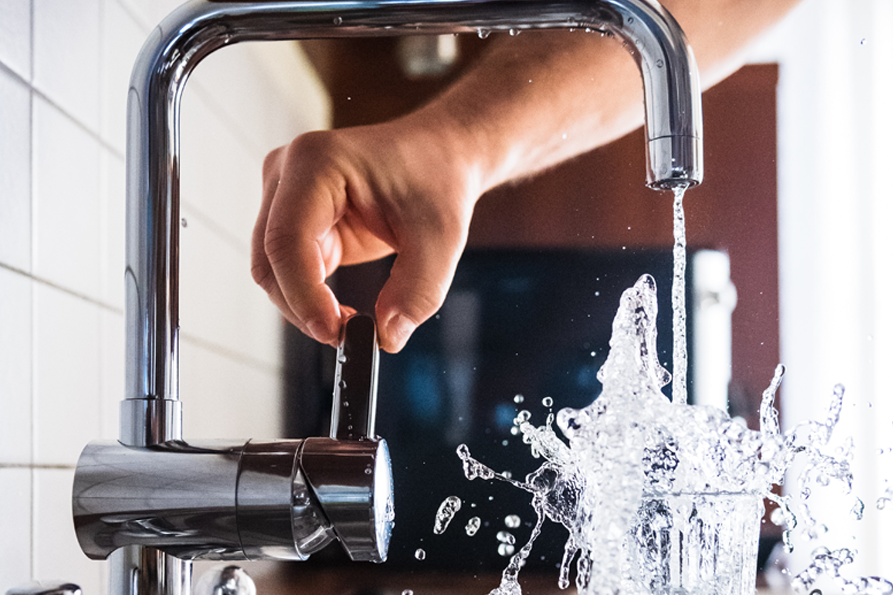
How Does a Water Dispenser Work? Considering a Bottleless Dispenser for your Office
October 30, 2023Why You Shouldn’t Have Water Delivered to Your Office
December 28, 2023Water from the Tap Hurts Your Workspace
We here at PureAquaTek know that there are so many options for drinking water. We want to ensure you know the possibilities and consequences of specific water options.
The Risks of Using Water from the Tap in Your Office
Using tap water in the office workspace may pose several risks. Often, tap water comes laden with unsafe levels of impurities and harmful chemicals like chlorine, lead, and other biological contaminants that can compromise the health and well-being of your workforce.
The quality of tap water can vary greatly depending on the source and local plumbing conditions, potentially leading to inconsistent-tasting beverages, which could impact staff satisfaction.
The effect on employees extends beyond physical health implications. Consuming drinking tap water laced with contaminants can lead to a range of health issues, including stomach pain, long-term chronic conditions, or even diseases like lead poisoning. This can result in increased sick days, decreased productivity, and lower overall performance.
Identifying Tap Water in Your Workspace
Several telltale signs can help determine if you use tap water in your workspace. First, please check if your water source is directly connected to public drinking water systems without any purification or filtration system- this clearly shows tap water usage.
Second, a chlorine-like smell or taste is often associated with tap water, as chlorine is commonly used in municipal water treatment.
Additionally, you may observe discoloration or floating particles in your water, signifying the probable presence of impurities. Regular water testing can also provide substantial evidence of tap water usage; higher levels of contaminants such as lead or chlorine are typical signs.
Lastly, an increased usage of single-use plastic water bottles in the office is also suggestive of tap water consumption.
Benefits of Investing in a High-Quality Water Filtration System
Investing in a high-quality water filtration system for your workspace offers numerous health effects. Firstly, it allows you to provide clean, safe water to your employees, reducing the risk of public health issues linked to waterborne contaminants. With less reliance on tap water, this will protect your workforce from harmful chemical compounds like chlorine and lead.
Secondly, employees will appreciate the water’s improved taste and overall quality, positively impacting their satisfaction and feeling valued. This can lead to boosted morale and increased productivity in the long run.
Thirdly, a high-quality water filtration system can also be more environmentally friendly. By providing filtered drinking water, your workspace can reduce the dependence on single-use plastic bottles, contributing to a more sustainable environmental footprint.
Lastly, these systems could save you money over time. Although there may be an upfront cost, the long-term savings from not having to purchase bottled water or deal with health complications from contaminated water can make the investment worthwhile.
Implementing a high-quality water filtration system thus offers a multi-faceted solution, promoting the health and well-being of your workforce, enhancing employee satisfaction, supporting environmental sustainability, and providing long-term cost savings.
The Different Types of Water Dispensers Available in the Market
PureAquaTek has a wide range of bottleless water dispensers, each with unique features and advantages.
- TEK-12: This machine provides water and ice together in one. The Tek-12 uses state-of-the-art reverse osmosis purification to produce bullet ice and hot, cold, and ambient water from recessed spigots.
- TEK-9: Hygienic and ergonomic, Tek-9 flourishes in all environments — from the boardroom to the recreation center. Its compact size, large dispensing area, multiple water options, and LED UV to maintain system cleanliness make the W9 our most innovative model.
- TEK-DMI: The Tek-DMI features the latest filtration and LED UV technologies to provide a continuous supply of clean and fresh nugget ice alongside filtered water in a cooler-sized format without the need for bulky 5-gallon or plastic single-use bottles and clunky ice machines.
Each dispenser has pros and cons; the best one for your office depends on your specific needs, space availability, and budget. We here at PureAquaTek would love to meet with you and see which dispenser fits your office needs.
Resources and Advice to Maintain a Healthy and Safe Workspace
Maintaining a healthy and safe workspace is integral to the well-being and productivity of your employees.
The Safe Drinking Water Act (SDWA) is a pivotal piece of legislation in the United States, enacted in 1974 to ensure the safety of public drinking water. This law authorizes the Environmental Protection Agency (EPA) to set national health-based standards for drinking water to protect against both naturally occurring and man-made contaminants that may be found in drinking water.
The EPA, states, and water suppliers then work together to make sure that these standards are met. Understanding and complying with the SDWA can help ensure the safety and health of your office’s drinking water, making it a key part of maintaining a healthy workspace.
Additional resources for maintaining a water-safe workspace include the Occupational Safety and Health Administration (OSHA), which provides guidelines on keeping safe and healthy working environments. They offer regulations and resources on water quality and safety that can be invaluable for any workplace.
Moreover, adopting a water management program following the Centers for Disease Control and Prevention (CDC) guidelines can help prevent water-associated diseases and maintain the water quality in your office.
Regularly maintaining and cleaning your water dispensers and filtration systems is crucial to ensure they function optimally and provide safe, clean water. This includes regularly changing filters and scheduling preventive maintenance.
Lastly, fostering a water-conscious culture among your employees can significantly contribute to maintaining a water-safe workspace. Encouraging staff to report any concerns about drinking water quality and educating them about water safety and sustainability can be fundamental to maintaining a healthy workspace.


